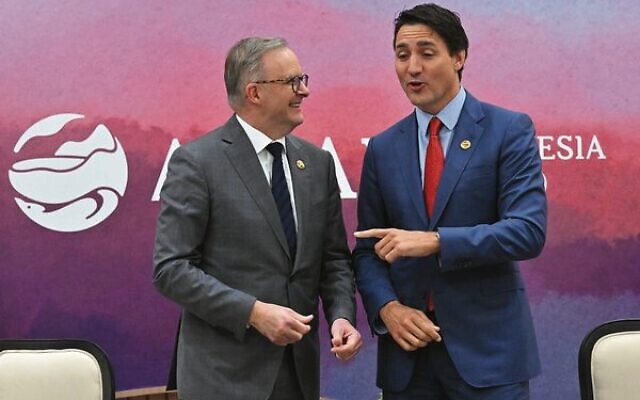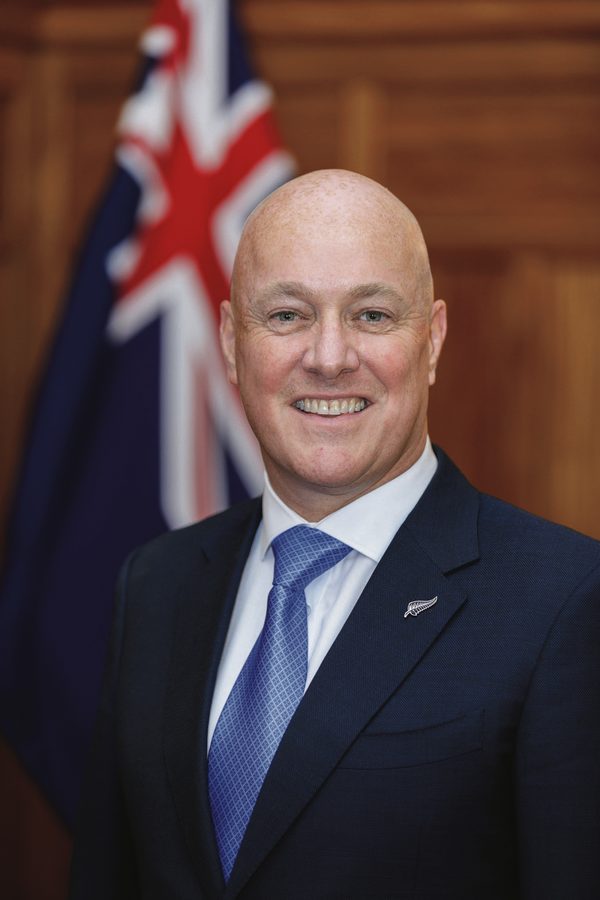No understanding of realities on the ground

American comedian Will Rogers once quipped, “People are taking their comedians seriously and their politicians as a joke.” It’s still true. Proof was laid out recently in the joint statement by the prime ministers of Canada, Australia and New Zealand, who now perform together, reprising Rogers’ contemporaries, as the “three stooges from CANZ”.
The UN’s principal court has begun hearing 52 states’ legal presentations that advocate global sanctions on Israel, most from Islamic countries. They argue the main reason for sanctions is that Israel is not facilitating the creation of a Palestinian state on its borders. One can only dread the barbarity of attacks that would emanate from a hostile Palestinian state on the hills overlooking Tel Aviv and electing Hamas. The CANZ trio aren’t opposing sanctions. They are not presenting. They’re not serious on these issues.
The three Prime Ministers joked straight-faced that under a permanent ceasefire, Hamas would lay down its arms and immediately release hostages. The joint statement warned Israel against a “devastating” and “catastrophic” ground operation in Rafah and said an immediate humanitarian ceasefire was urgently needed.
The call for Israel to abandon its planned military operation in Rafah shows no understanding of what’s happening on the ground. It ignores the fact that Israeli leaders have stated they won’t launch a ground invasion without such measures to avoid adverse humanitarian impacts and that Israel is currently delaying the operation so it can implement a credible mass evacuation plan to the north.
Hamas expected Israel to invade after committing and publicising its murders, tortures and rapes of October 7. But it didn’t expect the Israeli response to be so effective and misjudged Israeli endurance despite international hostility.
Naysayers who said Israel couldn’t defeat Hamas and would suffer thousands of casualties have been proven wrong, so far. Israel Defence Forces faced around 30,000 trained Hamas fighters at the start of the war. Gaza’s extensive tunnel networks, the presence of Israeli hostages and shielding by millions of Gazan civilians created an enormously complex battlefield.

The IDF has lost 562 soldiers, a total that includes 373 soldiers and local security officers, who died defending against the Hamas attack on October 7 itself. The lowest figures of enemy casualties quoted by the IDF are approximately 10,000 Hamas fighters killed, along with an equal number of wounded. The ratio of casualties between the IDF and Hamas with other Palestinian factions is over 1:40, a surprisingly high ratio.
Another significant achievement is the relatively low ratio of Gazan civilians, as compared to Hamas combatants, killed. In 2022, the UN Secretary-General lamented rising civilian casualty ratios globally, up to 9:1 in urban warfare. In this urban warfare in the Gaza Strip, Israel claims a ratio less than 2:1, despite the Hamas military strategy of “human shielding”.
Hamas is fighting for Israel’s destruction without any care for civilian casualties. It’s willing to fight to the last civilian. Yet, British military historian, Lord Roberts of Belgravia, told the House of Lords recently that the Gazan civilian to combatant casualty ratio is “an astonishingly low ratio for modern urban warfare … and is a testament to the professionalism, ethics and values” of the IDF.
While Israel has mostly established control of the northern part of the Gaza Strip, Hamas forces are still strong in southern Gaza. Its remaining organised fighting units are largely in Rafah, along with the group’s leaders and its 130 Israeli hostages. Six of Hamas’s 24 battalions remain functional in this last bastion and battle ground. Egypt is constructing barriers in the Sinai desert along the Gaza border, mainly to block a Palestinian refugee influx from Rafah that might also prevent Hamas escape routes.
The joint statement of the three CANZ PMs calling on the IDF not to operate in Rafah seeks to deter Israel’s military operation but also assists Hamas in its campaign to retain power, rebuild its military capabilities and to attack Israel again. The joint statement also sends a message that it’s acceptable to use civilians as human shields. Yet Israel will persist for as long as it takes to finish Hamas’s fighting strength and secure itself. Israeli war cabinet minister, Benny Gantz has said if the hostages aren’t freed by Ramadan, Israel will push into Rafah. The holy Muslim month of Ramadan begins on March 9. On Sunday, Prime Minister Benjamin Netanyahu said that incursion into Rafah could be “delayed somewhat” but not cancelled if a hostage agreement was secured.
Australian Middle East diplomacy seems adrift. Just over a week ago a senior official from the Department of Foreign Affairs and Trade told a parliamentary committee that everything was being properly managed at the UN Relief and Works Agency for Palestinians. It has long been alleged that UNRWA has been captured by Hamas in Gaza. Israel estimates that 50 per cent of its workers have family members in Hamas, 10 per cent are themselves active Hamas members and 1.5 per cent are Hamas combatants. UNRWA workers were identified among the kidnappers, murderers, rapists and torturers that massacred Israelis on October 7. UNRWA headquarters even supplied electricity for the Hamas headquarters located underneath them in Gaza.
The satirical Will Rogers claimed, “I don’t make jokes. I just watch the government and report the facts.” That’s the cue for canned laughter at the end of the latest episode of the “three stooges from CANZ”.
Anthony Bergin is a senior fellow at Strategic Analysis Australia. Greg Rose is professor of international law at the University of Wollongong.

comments